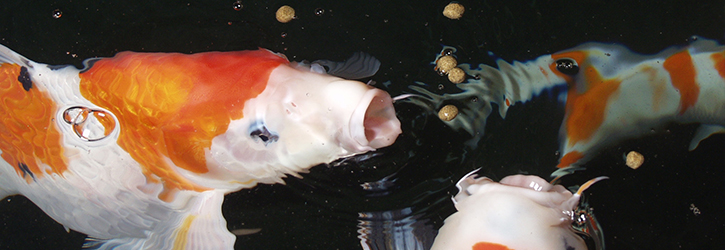Are you feeding your fish too much?
In short, if there is left over food in your pond after about 5-10 minutes of putting it in there, then yes, you’re overfeeding. However, as you’re asking this question we assume you’d like to know a little more about feeding, so here’s everything you need to know, starting with a statement you really need to remember:
More fish die from over feeding than underfeeding

And here’s why:
- Excess food can decay creating ammonia in your pond (as does fish waste) which upsets the balance of your pond and harms your fish.
- Fish don’t need to feed every day. Unlike humans some fish can sustain themselves for a couple of days without eating or will scavenge for food in the pond. Now this is not to say you shouldn’t feed them, but to be aware that less is more.
“But how do I know how much to feed my fish?”
Here are a few tips:

- All fish are different so don’t treat them all the same.
- The rule of thumb is to feed your fish the amount they will eat in 5-10 minutes
- You can start by estimating a small amount of food, leaving it in the pond for 5-10 minutes and then removing any leftovers.
- If a lot is left cut down the portion next time
- If none is left try adding a bit more next time to find a balance
- We suggest feeding your fish 2 to 3 times a day
- The most important tip for fish feeding is to remove anything left uneaten. This will cut down on the harmful chemicals caused by rotting food waste and make your fish much healthier and happier.
How often should you feed your pond fish?
Fish don’t need to eat every single day, some can go a couple of days without eating. That said, we suggest feeding your fish 2 to 3 times a day to help promote growth.
Most types of pond fish are cold-blooded, so their metabolism and activity levels are influenced by the water temperature. In the summer months when the water is warmer, your fish will be more active and may require more food. Whereas in the winter when the water is colder, your fish will be less active and require less to no food.
What can you feed your pond fish?
Just like us humans, fish need a balanced diet to live and stay healthy. There are two main factors that affect which food is suitable for your fish:
- The type of fish – different types of fish have different requirements, so it’s important to know which food is best for your species.
- The time of year – fish can struggle to digest foods when water temperatures are low, so may require specially formulated foods during colder months.
There are a number of options when it comes to feeding your fish, including:
Pellet food
Pellets are ideal for medium to large fish as they are denser than other types of fish foods. They can also be ideal for bottom feeders as they sink to the bottom of the pond.
Not only do they provide a balanced diet with essential vitamins, minerals, and high protein needed for growth, but they also come in a variety of sizes to suit the different types of fish in your pond.
If you choose to feed your fish pellets, you may wish to use floating pellets, which can help you monitor how much food your fish are eating.
Flake food
Flake food is more popular for indoor fish, but can still be a good option for small to medium ponds, or pond fish that are too small for sticks or pellets. But for certain types of fish, like Koi, flakes may not be enough, unless you were to feed them large quantities which could cost more than for other types of foods.
It’s also great for fish that feed at the surface of the water, as they will float on top of the water for a period of time before sinking. The downside to flake food is that it breaks down quickly, and if not eaten, can pollute your pond.
Stick food
Stick food is a popular option for feeding pond fish, suitable for various types of fish. When added to your pond, the sticks will soften quickly for easy consumption by most types of fish. Stick food is also less likely to impact your water’s health, as they produce less waste than pellet or flake food.
Our Fit & Wild pond sticks provide a natural and sustainable choice for your fish. Fishmeal-free, made with real insects and crustaceans to provide a complete and nutritious diet for your fish.
Do you need to feed your pond fish in winter?
In most cases, you don’t need to feed your fish during winter – in fact, it could actually hinder them rather than help them. While the UK weather can sometimes be hit-and-miss, your fish will likely stop feeding towards the end of October till around the end of February.
